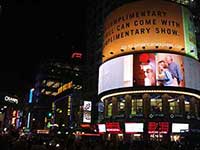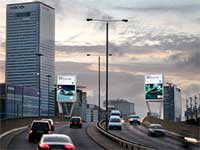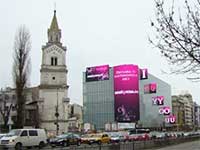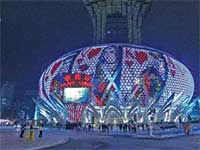Smart Digital Cities
We start publishing materials on information security and trusted IP systems that is closely related to spreading of digital technologies in modern “Smart cities”. As the ICT systems become more and more wide-spread, they become obvious targets to cyber attacks. The information environment is complex, many systems are interconnected, and therefore the vulnerability of ICT systems increases. Be it a malicious intent or human error, those responsible for security measures within the information environment must come up with innovative and resilient solutions to protect our life.

As digital technologies are spreading all over the planet, new concepts, new products and new professions appear almost on a daily basis. Cities become the testing ground for all digital novelties and turn increasingly intelligent and smart.
The expression “Smart City” is becoming quite common and wide-spread. The development plans of cities around the world cannot be put together without including “smart city” ideology. We are all familiar with the concept of the Smart City, a city which uses digital technologies to improve the quality of public and private services, while reducing costs and resource consumption.
Rather than using the “smart city” concept, the Intelligent Community Forum (ICF), a New York-based think tank established back in 1990, prefers to focus on Intelligent Communities. The Intelligent Communities are defined as cities and regions that use technology not just to save money or make things work better, but also to create high-quality employment, increase citizen participation and become great places to live and work.

Every year, since 1999, the ICF has been naming the world’s most intelligent community. Recently the organization announced the list of finalists for 2015, which included 7 cities and towns from 5 different nations (the United States, Australia, Brazil, Canada, and Taiwan). Except perhaps for Rio de Janeiro, the names selected are not well-known among the general public.

That is why it is especially interesting to understand what made renowned economists, politicians and businessmen select fairly unfamiliar towns putting them ahead of huge conglomerates like London, New York, Tokyo or Mexico City; rather, the candidates are mainly mid-sized cities, that have found in the “broadband economy” a way to rethink themselves, improve life quality and create attractive conditions for workforce.
Arlington County, Virginia, USA
Arlington County benefited a lot, in the past, from being close to Washington DC and being home to the Pentagon, the Defense Advanced Research Projects Agency and the National Science Foundation. But decisions by the US Department of Defense will empty 3.2 million square feet and export 13,000 jobs over the next several years.
The county is seeking to reduce its vulnerability to Federal decision-making, through “The Arlington Way”, a formal structure of more than 40 citizen advisory groups and commissions, which influence decisions on everything from land use to technology, and with the Telecom Master Plan, a public-sector fiber network which seeks to reinvent the way citizens engage with government.
Columbus, Ohio, USA
Home to the highest metropolitan concentration of Fortune 1000 companies in America, but also to a large, low-income population stranded by the decline of low-skilled factory employment, Columbus is trying to bridge the gap between these two worlds through collaboration among government, education, business and institutions.
Thanks to startup acceleration programs, business mentoring, seed funding and capital attraction, Columbus has been one of a handful of U.S. metros that turned a brain drain in 2005-2007 into brain gain in 2007-2009. Employment growth in skilled manufacturing has exceeded 35% over the past decade and, in 2013, Columbus was named one of the top 10 cities in the US for new college grads.
Mitchell, South Dakota, USA
In the past mainly a rural city, that the most brilliant and ambitious left behind in search of a brighter future elsewhere, in recent years Mitchell has been able to create another economy on top of the agricultural one.
The Mitchell Technical Institute (MTI) has invested $40 million in a new technology-based campus, where it trains hundreds of communications and data technicians, and a local angel investors network has sprung up and begun incubating new communications startups. Engineering, consulting and software companies have made Mitchell into a regional hub for expertise and services, transforming the city in a magnet for ICT talent.
Ipswich, Queensland, Australia
In 2011, the city of Ipswich published a 20-year economic development plan. It forecast the addition of 292,000 new residents and 120,000 jobs. The city has just commenced a major redevelopment of its center, where digital technologies will be used to attract commercial and residential tenants and to improve public safety.
Green standards will make the city center one of the most sustainable in Australia, so much so that when the plan is completed, in 2031, it will mark the emergence of one of Australia’s model cities.
New Taipei City, Taiwan
For the second time in a row in the top seven, New Taipei City (NTC), created in 2010 from the county surrounding Taiwan’s capital city of Taipei, is developing a knowledge-based economy to power its future. The focus has been mainly on broadband: the household penetration rate is at 91% with 87% on 100 Mbps service.
NTC has also connected more than 300 schools, put tablets and computers into classrooms and has facilitated the installation of more than 10,000 Wi-Fi hotspots in convenience stores. Massive investment went into high-speed roads and rails to unite the doughnut-shaped city, while broadband advances coupled with a Knowledge-Bridge project has driven industry-university collaboration projects and provided talent and job matchmaking.
Rio de Janeiro, Brazil
Probably the best known of the pack, Rio is more famous however for its beaches, Carnival spirit and favelas than for being a vibrant business hub. But preparation for the 2014 World Cup and the 2016 Olympic Games has given the city the chance to revitalize itself, create a better transportation system and deal with long-standing infrastructure problems.
ICT programs such as the Rio Datamine (an open-data system that makes available vast amounts of city information) are also playing an important role in giving a boost to the economy. The municipality has built Knowledge Squares in nearly 40 low-income, crime-ridden neighborhoods, and 32 digital facilities which have provided digital literacy training to 69,000 citizens. Thanks also to the discovery of vast offshore oil fields, Rio is now receiving twice the foreign direct investment of Sao Paulo.
Surrey, British Columbia, Canada
Surrey is Canada’s third fastest-growing city, part of the metropolitan area of Vancouver. To foster development, is focusing on a project called Innovation Boulevard, overseen by the Mayor’s Health Technology Working Group, comprised of 50 representatives from universities, a health authority, nonprofits, business associations, government and developers.
City, universities and business are building clusters in health technology, clean tech and advanced manufacturing, and a range of smart-city systems are improving livability and better engaging with citizens. The goal is to boost local employment by almost 50%.
Conclusion
Thus, the decision of the ICF Forum shows that the wide use of digital media and digital services is the most urgent task from the point of view of municipal authorities. Digital environment is directly related to creating new workplaces, providing citizens with better and new services. For the first time, digital services become an important factor in city economy and are therefore worth investigating further. This is what we plan to do in our future articles.





